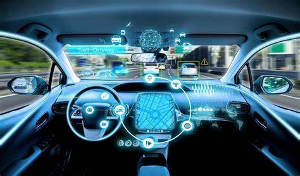How Will AI Impact The Motor Trade Industry?

In the dynamic landscape of technological advancement, the trajectory of computer capabilities suggests exponential growth, doubling every twelve to eighteen months.
This forecast anticipates that in a decade, computers will be a staggering 1,000 times more powerful than they are today.
The motor trade industry, renowned for its innovative spirit, is once again at the forefront of this technological evolution.
Recent noteworthy crossovers from the technology sector into motoring exemplify this trend, with Intel’s acquisition of Mobileye and Google’s ventures into self-driving cars being prime examples.
Robots and AI set to play an important role in motor trade
While using robots in manufacturing is not a novel concept, recent years have witnessed a surge in deployment. With over 3 million industrial robots globally, a substantial 38% operate within the motor trade sector.
Projections by the International Federation of Robots indicate a 20% increase in the robotic workforce of automotive manufacturers in the next three years.
Yet, amid the robotic revolution, artificial intelligence (AI) holds the potential to spark the newest industrial revolution. Fueled by vast data, AI systems can replicate human decision-making processes with unparalleled speed and accuracy, processing thousands of decisions almost instantaneously.
However, as technology reshapes this landscape, concerns arise about the potential impact on the workforce. With the pressure to cut labour and overheads, jobs in the sector may be lost to technological redundancy, a prospect that raises serious questions about the future of employment.
According to Forbes, more reliance on robots can lead to decreased efficiency, increased waste, and downtime. There seems to be a sweet spot, so not all motor mechanics, auto technicians, and insurance brokers need to panic just yet. An 8% reduction in the workforce is the tipping point, balancing efficiency and adaptability.
Self-driving cars and new technology raise questions
Autonomous driving has been a topic of discussion for some time, with manufacturers divided on its feasibility. While some continue to invest in the technology, others adopt a wait-and-see approach. The emergence of autonomous vehicles with limited self-driving capabilities is now a reality, thanks in no small part to artificial intelligence’s (AI) power.
The breakthrough lies in vehicles equipped with sophisticated sensors, radar, cameras, and lidar processing real-time data through AI algorithms that make decisions across diverse scenarios, from traffic to lengthy journeys.
Despite the advancements, questions linger, particularly regarding liability in the event of accidents. Platforms like MIT’s Moral Machine are addressing these ethical concerns, aiming to instil a moral code into AI to guide decision-making in critical situations.
Our familiarity with expansive in-car screens is evolving, with digital instruments and augmented reality head-up displays becoming more potent thanks to AI integration. Manufacturers are experimenting with advanced voice assistants, employing technologies capable of managing intricate tasks and enhancing the overall driving experience. Over-the-air updates (OTA) will play a pivotal role in keeping vehicles up to date with evolving technology.

For electric car enthusiasts, GPS is indispensable for locating charging stations. AI is set to revolutionise this aspect, offering real-time route recalculations based on traffic, weather conditions, and changes in driving style. Additionally, AI will enhance battery management, optimising charging processes and overall efficiency.
In the Internet of Things (IoT) era, connectivity is ubiquitous. AI plays a central role in creating a network where smartphones, household appliances, and cars communicate seamlessly.
Despite the looming challenges, there’s optimism. As AI evolves, employers must take responsibility for impacted workers, redeploying them where possible and supporting outplacement programs. However, short-term thinking has led to a shortage of STEM-skilled candidates, driving up pay rates and creating a skills gap.
AI set to transform multiple industries
Many UK industries face the impending impact of these technological changes, and unemployment rates may rise. Yet, amidst this revolution, opportunities for change arise. The private sector, particularly recruitment solutions businesses, will be crucial in guiding companies through this transformation.
Solutions may involve alternative models for contingent labour, such as outsourcing work packages or seeking consultancy on workforce planning. Total talent management solutions, encompassing the entire talent lifecycle, offer a holistic approach to addressing skills gaps and workforce planning.
Collaboration between competing businesses will be essential, necessitating investments in retraining the workforce and maximising productivity. As the technological revolution unfolds, humans must embrace and shape the future.







